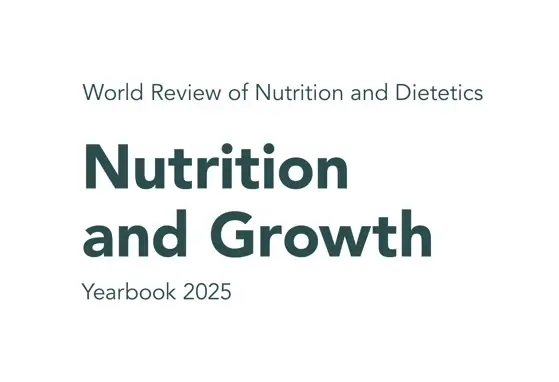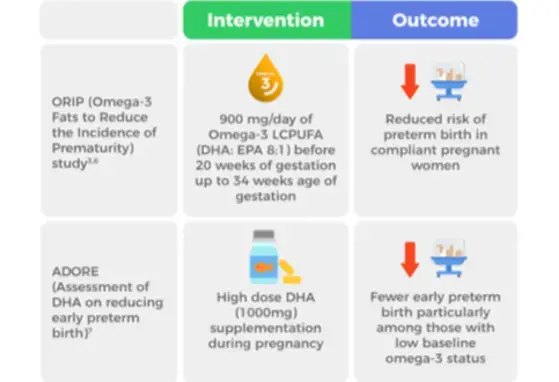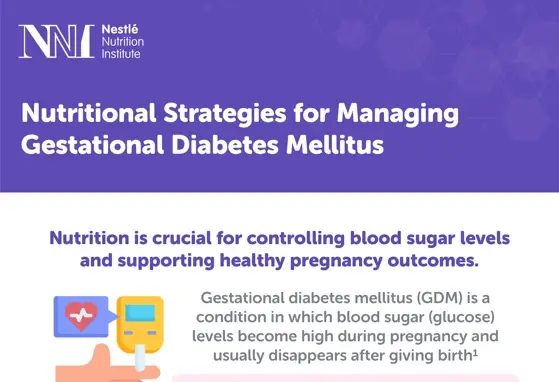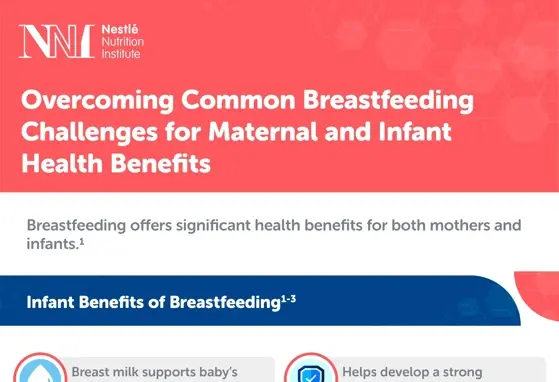Does DHA supplementation reduce preterm births?

An estimated 15 million babies are born preterm every year.1 More than 85% of all perinatal problems and fatalities are caused by preterm birth.1,2 Being born too soon has several short- and long-term implications.1 Despite extensive research, the precise mechanism that causes preterm birth (PTB) remains unknown. Maternal nutrition before and throughout pregnancy is critical for delivering the nutrients needed for fetal growth and may be a factor in the risk of preterm delivery. Numerous dietary nutrients and patterns have also been associated with reducing risks for PTB, however only omega-3 long-chain polyunsaturated fatty acids, particularly DHA, have shown the strongest evidence.1
What Is DHA?
Long-chain polyunsaturated fatty acids (LC-PUFAs) are fatty acids with 18–20 carbons or more, which can be categorized into two main families: omega-6 (ω6 or n-6) and omega 3 (ω3 or n-3) depending on the position of the first double bond from the methyl end group of the fatty acid. They are extensively dispersed in nature and are significant elements of animal lipid metabolism. They also play a major role in human food and physiology. Main omega 3 LC-PUFA in food sources include DHA (docosahexaenoic acid), ALA (α-linolenic acid), EPA (eicosapentaenoic acid).
DHA is an essential omega-3 fatty acid that people need to get from diet or supplements since our body cannot produce this on its own. It is an important nutrient for overall health that aids in lowering the risk of heart diseases, fighting inflammation, lowering blood pressure, and supports men's reproductive health. In pregnancy, DHA plays a crucial role in the fetus’s brain and eyelid development.3
Foods containing DHA include fish, seafood, fortified milk, eggs, and cereals. To ensure appropriate consumption, pregnant women are often recommended to consume 200 mg of DHA per day.3
How does DHA help reduce early preterm birth risk?
The World Health Organization defines preterm birth as any birth occurring before 37 weeks of pregnancy, or within 259 days after the mother's last menstrual period. Prematurely born babies are more likely to suffer health issues at birth and later in life than infants born full term. They are also at risk of developing long-term intellectual and developmental difficulties, as well as issues with their lungs, brain, eyes, and other organs.
Research reveals that omega-3 fatty acids, especially DHA, can help reduce the risk of preterm birth. The exact mechanism of action of Omega-3 acids is still unknown but it has been hypothesized that their action is due to their anti-inflammatory activity which may interfere with the inflammatory cascade of labor.1
The balance of omega-3 and omega-6 fatty acid metabolites is important for maintaining normal gestation duration and is a key factor in cervical softening and the start of labor.1 A high omega-6/omega-3 fatty acid ratio will induce a pro-inflammatory eicosanoid production that has been associated with labor at term and preterm. A higher intake of omega-3 fatty acids leads to a down-regulation of the synthesis of omega-6 fatty acids and consequently reduces the production of the eicosanoids responsible for cervical changes in early labor.
A Cochrane Review, (review of 70 randomized clinical trials including 20k women) showed that supplementation between 500 - 1000 mg of omega-3s daily, with at least 500 mg of DHA reduces preterm births <37 weeks by 11% and <34 weeks by 42%.3 However, a recent randomized clinical trial (1100 women) has indicated that women with low DHA levels at the beginning of the trial who received the higher dose of 1000 mg per day had fewer early preterm births. But For women who began the study with already high DHA levels, there was no benefit of the higher dose.4
The researchers from the last study have recommended that clinicians advise pregnant women with low DHA status to consume a DHA supplement of 1000 mg per day to reduce their odds of delivering before 34 weeks of gestation.4 However, the exact required dose of DHA to reduce preterm birth still needs to be confirmed.
References
- Makrides M, Best K. Docosahexaenoic acid and preterm birth. Annals of Nutrition and Metabolism. 2016;69(Suppl. 1):29-34.
- Swanson D, Block R, Mousa SA. Omega-3 fatty acids EPA and DHA: health benefits throughout life. Advances in nutrition. 2012 Jan;3(1):1-7.
- Middleton P, Gomersall JC, Gould JF, Shepherd E, Olsen SF, Makrides M. Omega-3 fatty acid addition during pregnancy. Obstetrical & Gynecological Survey. 2019 Apr 1;74(4):189-91.
- Carlson SE, Gajewski BJ, Valentine CJ, Kerling EH, Weiner CP, Cackovic M, Buhimschi CS, Rogers LK, Sands SA, Brown AR, Mudaranthakam DP. Higher dose docosahexaenoic acid supplementation during pregnancy and early preterm birth: a randomised, double-blind, adaptive-design superiority trial. EClinicalMedicine. 2021 Jun 1;36:100905.
If you liked this post you may also like


Reducing the Risk of Preterm Birth Through Maternal Nutrition Interventions

Nutritional Strategies for Managing Gestational Diabetes Mellitus

Overcoming Common Breastfeeding Challenges for Maternal and Infant Health Benefits